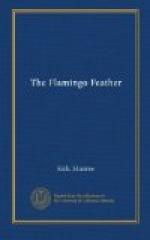The English fleet proved to be that of the brave Sir John Hawkins, the bluff old sea-king whose very name was a terror to all Spaniards. He was on his way back to his own country from one of the famous cruises to the Spanish Main and the West Indies that were even then making him world-renowned. He had captured many Spanish ships laden with treasure in gold and silver from the mines of Mexico and Peru, and when he learned of the sad plight of the Chevalier Laudonniere and his people, he promptly offered to give them a ship in which they might safely undertake a voyage to their own country. Moreover, when he was told how slender was their store of provisions, he furnished the ship which he was about to give them with a supply of food that would last them for several months.
In the name of King Charles IX of France, Laudonniere, who had again assumed command of his little company unquestioned by the mutineers, thanked the brave Englishman for his great kindness to them, and accepted his generous gifts. Then the English fleet, with a parting salute from its loud-mouthed cannon, bore away and resumed its homeward voyage. At the same time the Frenchmen started back for the River of May, where, under shelter of the land, they proposed making the transfer of their property from their own crazy craft to the stout ship which they had received from the English admiral. Thus it happened that the sunset of that eventful day found them in the very same place from which they had so willingly departed that morning, and had never expected to see again.
At this time Laudonniere made another earnest effort to induce his men to return to Fort Caroline, and there await patiently the arrival of Jean Ribault, now that they had a supply of provisions and a good ship, but to no avail.
Simon, the armorer, expressing the sentiments of all the rest, save only Le Moyne and Rene de Veaux, said,
“What with fightings and fevers, we are in no condition to drive out the savages who have doubtless ere this entered into full possession of Fort Caroline. If we did regain the fort, what could we do save remain there until this heaven-sent store of provisions should be exhausted? and then would we not be in as sad a plight as before? No, your Excellency, let us return to our own land while we may, and not linger here longer in the hope of succor which seems likely never to be sent.”
So Laudonniere, having numbers against him, was forced to accept the situation as he had done before, and the work of transfer from one vessel to the other proceeded rapidly.
When it was accomplished, and they were ready to start on their second venture, the elements were again against them, and for a week they were confronted by an impassable wall of foam-crested billows, breaking and roaring upon the bar in the most tumultuous confusion.
Late one afternoon, when their patience had become well-nigh exhausted by this tedious delay, all hearts were thrilled by the report of a fleet of ships seen far out at sea, but approaching the land. An anxious night followed, for again were the members of the little band torn with conflicting fears and hopes. Were the ships French, English, or Spanish? Daylight only could bring an answer to the question.




